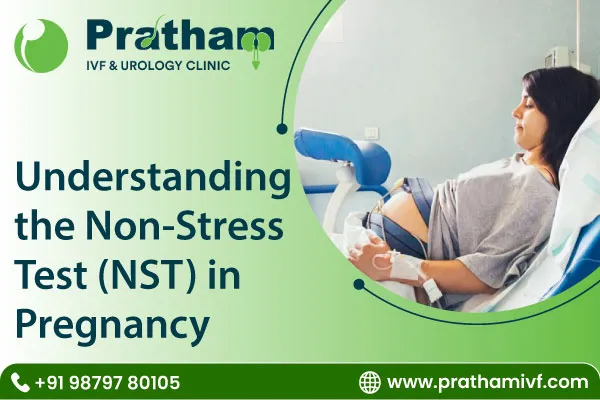
The Non-Stress Test (NST) is a safe and painless prenatal test used to monitor the baby's heart rate in response to its movements. It helps doctors assess the baby's overall well-being, especially in the third trimester or high-risk pregnancies. During the test, sensors are placed on the mother's belly to measure fetal heart rate and contractions. If the baby's heart rate increases with movement, it usually indicates that the baby is healthy and receiving enough oxygen. The NST is important for detecting early signs of distress or complications, such as reduced oxygen or placental problems. It is often recommended for pregnancies with conditions like high blood pressure, diabetes, low amniotic fluid, or if the baby isn't moving as expected. By identifying potential risks early, the NST allows timely medical intervention and ensures a safer pregnancy journey for both mother and baby.
What Is the Non‑Stress Test?
The Non‑Stress Test (NST) is a common prenatal screening used to check your baby's heart rate and overall well-being. It records how the baby's heart responds to movements, helping doctors assess oxygen levels and detect any signs of fetal distress. The NST is safe, painless, and non-invasive, usually performed in the third trimester or during high-risk pregnancies. Sensors are placed on the mother's abdomen to measure heartbeats and contractions. If the heart rate increases with movement, it's a reassuring sign. The NST helps ensure timely care for both mother and baby during pregnancy.
Purpose of the NST
The NST helps your healthcare provider assess fetal wellness. It checks whether the baby's heart responds appropriately to movement, which is a sign of good health. NSTs are particularly important in pregnancies that may face complications.
What Happens During an NST?
During the NST, two sensors are placed on your abdomen. One records the fetal heart rate, while the other tracks uterine contractions or your baby's movements.
How the NST Is Performed
You'll recline in a comfortable chair. Once sensors are in place, you press a button whenever you feel movement. The machine records data over about 20–40 minutes.
What the NST Measures
- Increases in fetal heart rate (accelerations) reflecting a healthy response to movement
- Baseline heart rate and short‑term variations
- Any signs of stress or insufficient oxygen
Why the NST Is Important
- Detection of Fetal Wellness: NSTs help confirm that your baby's nervous system is functioning well and that it's growing and thriving.
- Monitoring Heart Rate & Movements: A responsive heart rate indicates that the baby's oxygen levels are adequate. It's a reassuring measure of fetal health.
- Spotting Potential Risks: NSTs can identify problems such as reduced oxygen supply or placental issues. Early detection allows timely interventions.
- Vital for High‑Risk Pregnancies: In cases like hypertension, diabetes, low amniotic fluid, or overdue pregnancies, regular NSTs help ensure the ongoing health of both mother and baby.
When Is the NST Recommended?
High‑Risk Pregnancy Scenarios
NSTs are often recommended for:
- Maternal diabetes or high blood pressure
- Reduced fetal movement
- Previous complications
- Post‑term pregnancies (beyond 41 weeks)
Other Indications
NST recommendations may arise from suspicion of fetal growth restriction, maternal illness, or multiple pregnancy.
Frequency of NSTs
Most high-risk pregnancies require weekly or bi-weekly NSTs starting in the third trimester, but your doctor may adjust based on individual needs.
What to Expect During an NST
- Preparation: No special preparation is needed. You can eat, drink, and move around before the test.
- Duration: NSTs typically take 20–40 minutes. If the baby is asleep, it may be extended slightly.
Understanding Your Results
- Reactive NST: Healthy—heart rate increases with movement
- Non‑Reactive NST: May need further testing like a biophysical profile or stress test
Risks and Limitations of the NST
- Risks: The NST is entirely safe—no radiation, medication, or known side effects.
- Limitations: NSTs may not always provide clear results, especially if the baby is sleeping. They can't detect all problems and are not a standalone diagnostic.
- Follow‑Up Tests: If the NST is inconclusive, your provider may recommend a biophysical profile (combining NST with ultrasound) or a contraction stress test for clearer assessment.
Why Choose Pratham IVF Center?
Choosing the right care provider matters, particularly when monitoring your baby's health is a priority. Pratham IVF Center, the best infertility clinic in Ahmedabad, offers comprehensive prenatal services with precision and compassion.
- Expert Care: Skilled specialists guide you through every step, ensuring your journey is medically safe and emotionally supported.
- Advanced Monitoring: We conduct Non-Stress Tests (NSTs) using the latest, reliable equipment to monitor your baby's heartbeat and movements accurately.
- Personalized Support: Every pregnancy is unique. We focus on customized care, prioritizing both your health and your baby's well-being at every stage.
- Emotional Comfort: Our environment is designed to provide a calm, stress-free experience, helping expectant mothers feel relaxed and confident during each test.
Whether it's your routine checkup or a high-risk case requiring close monitoring, Pratham IVF Center ensures you and your baby receive the highest quality prenatal care. We combine expertise, compassion, and advanced technology to give every family peace of mind and medical excellence.
Conclusion
The Non‑Stress Test is a vital tool for ensuring your baby's health during pregnancy. By monitoring your baby's heart rate and movements, NSTs help detect issues early and keep your pregnancy on track. Always discuss the need for NSTs with your healthcare provider, especially in high-risk situations. Early prenatal care, paired with the right medical partner, supports a healthy, confident journey toward parenthood.
Book your appointment today at Pratham IVF Center, Ahmedabad. Call: +91 98797 80105, Email: prathamivf@gmail.com
 Ahmedabad Top Rated IVF Center
Ahmedabad Top Rated IVF Center




